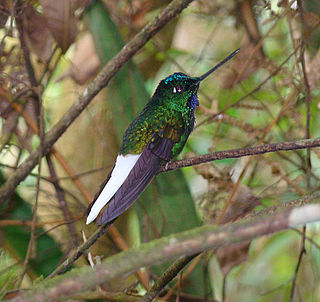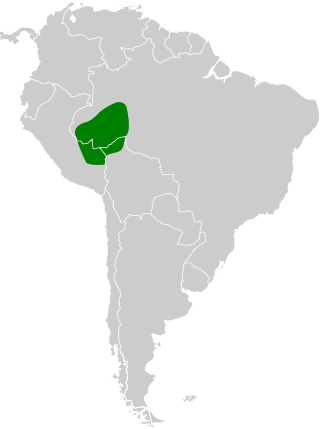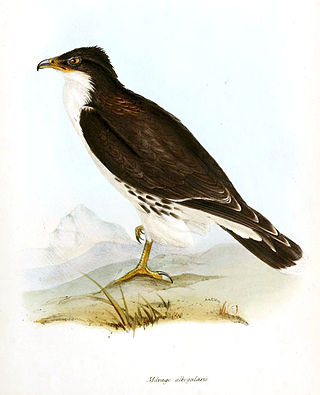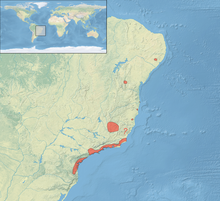
The white-throated hawk is a bird of prey in subfamily Accipitrinae, the "true" hawks, of family Accipitridae. It is found in Argentina, Bolivia, Chile, Colombia, Ecuador, Peru, and Venezuela.

The chestnut-bellied hummingbird is a Near Threatened species of hummingbird in the "emeralds", tribe Trochilini of subfamily Trochilinae. It is endemic to Colombia.

The white-tailed starfrontlet is a species of hummingbird in the "brilliants", tribe Heliantheini in subfamily Lesbiinae. It is endemic to the Sierra Nevada de Santa Marta of northeastern Colombia.

The hook-billed hermit is an threatened species of hummingbird in the family Trochilidae. It is endemic to a small area of Brazil.

The spangled coquette, coquette pailletée (French), coqueta coronada, or coqueta lentejuelada is a species of hummingbird in the "coquettes", tribe Lesbiini of subfamily Lesbiinae. It is found in Brazil, Colombia, Ecuador, Peru, and Venezuela.

The white-rumped hawk is a species of bird of prey in subfamily Accipitrinae, the "true" hawks, of family Accipitridae. It is found in Argentina, Bolivia, Brazil, Colombia, Ecuador, Paraguay, Peru, and Venezuela.

The rufous crab hawk or rufous crab-hawk, is a Near Threatened species of bird of prey in subfamily Accipitrinae, the "true" hawks, of family Accipitridae. It is found on Trinidad and along the South American coastline from eastern Venezuela to southern Brazil.

The rufous-thighed kite is a species of bird of prey in subfamily Accipitrinae, the "true" hawks, of family Accipitridae. It is found regularly in Argentina, Bolivia, Brazil, Guyana, Paraguay, and Suriname and as a vagrant in Colombia, French Guiana, and Venezuela.

The white-browed hawk is a species of bird of prey in subfamily Accipitrinae, the "true" hawks, of family Accipitridae. It is found Bolivia, Brazil, and Peru.

The grey-backed hawk is an Endangered species of bird of prey in subfamily Accipitrinae, the "true" hawks, of family Accipitridae. It is found in Ecuador and far northern Peru.

The semicollared puffbird is a species of near-passerine bird in the family Bucconidae, the puffbirds, nunlets, and nunbirds. It is one of seven species of the genus Malacoptila. It is found in Bolivia, Brazil, and Peru.

The fulvous-chinned nunlet is a species of near-passerine bird in the family Bucconidae, the puffbirds, nunlets, and nunbirds. It is found in Bolivia, Brazil, and Peru.

The white-throated caracara or Darwin's caracara is a species of bird of prey in the family Falconidae, the falcons and caracaras. It is found in Argentina and Chile.

The pallid dove is a species of bird in the family Columbidae. It is found in Colombia, Ecuador, and Peru.

The slate-throated gnatcatcher is a species of bird in the family Polioptilidae. It is found in Colombia, Ecuador, and Panama.

The yellow-browed woodpecker, also known as the white-browed woodpecker, is a Near Threatened species of bird in subfamily Picinae of the woodpecker family Picidae. It is found in Argentina, Brazil, Paraguay, and Uruguay.

The arrowhead piculet or Guianan piculet is a species of bird in subfamily Picumninae of the woodpecker family Picidae. It is found in Suriname and possibly French Guiana and Guyana.

The white-bellied piculet is a Vulnerable species of bird in subfamily Picumninae of the woodpecker family Picidae. It is found in Brazil, Guyana, and Venezuela.

The Chocó trogon, also known as the white-eyed trogon or blue-tailed trogon, is a species of bird in the family Trogonidae, the quetzals and trogons. It is found in Colombia and Ecuador.

The Ecuadorian trogon is a species of bird in the family Trogonidae, the quetzals and trogons. It is found in Ecuador and Peru.





















